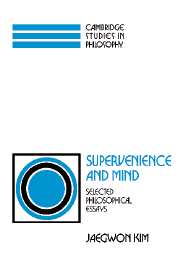Book contents
- Frontmatter
- Contents
- Preface
- Sources
- Part I Events and supervenience
- Part II Mind and mental causation
- 10 Psychophysical supervenience
- 11 Psychophysical laws
- 12 What is “naturalized epistemology”?
- 13 Mechanism, purpose, and explanatory exclusion
- 14 The myth of nonreductive materialism
- 15 Dretske on how reasons explain behavior
- 16 Multiple realization and the metaphysics of reduction
- 17 The nonreductivist's troubles with mental causation
- 18 Postscripts on mental causation
- Index
16 - Multiple realization and the metaphysics of reduction
Published online by Cambridge University Press: 28 January 2010
- Frontmatter
- Contents
- Preface
- Sources
- Part I Events and supervenience
- Part II Mind and mental causation
- 10 Psychophysical supervenience
- 11 Psychophysical laws
- 12 What is “naturalized epistemology”?
- 13 Mechanism, purpose, and explanatory exclusion
- 14 The myth of nonreductive materialism
- 15 Dretske on how reasons explain behavior
- 16 Multiple realization and the metaphysics of reduction
- 17 The nonreductivist's troubles with mental causation
- 18 Postscripts on mental causation
- Index
Summary
INTRODUCTION
It is part of today's conventional wisdom in philosophy of mind that psychological states are “multiply realizable”, and are in fact so realized, in a variety of structures and organisms. We are constantly reminded that any mental state, say pain, is capable of “realization”, “instantiation”, or “implementation” in widely diverse neural-biological structures in humans, felines, reptiles, mollusks, and perhaps other organisms further removed from us. Sometimes we are asked to contemplate the possibility that extraterrestrial creatures with a biochemistry radically different from the earthlings', or even electro-mechanical devices, can “realize the same psychology” that characterizes humans. This claim, to be called hereafter ‘the Multiple Realization Thesis’ (“MR”, for short), is widely accepted by philosophers, especially those who are inclined to favor the functionalist line on mentality. I will not here dispute the truth of MR, although what I will say may prompt a reassessment of the considerations that have led to its nearly universal acceptance.
And there is an influential and virtually uncontested view about the philosophical significance of MR. This is the belief that MR refutes psychophysical reductionism once and for all. In particular, the classic psychoneural identity theory of Feigl and Smart, the so-called “type physicalism”, is standardly thought to have been definitively dispatched by MR to the heap of obsolete philosophical theories of mind. At any rate, it is this claim, that MR proves the physical irreducibility of the mental, that will be the starting point of my discussion.
- Type
- Chapter
- Information
- Supervenience and MindSelected Philosophical Essays, pp. 309 - 335Publisher: Cambridge University PressPrint publication year: 1993
- 23
- Cited by



